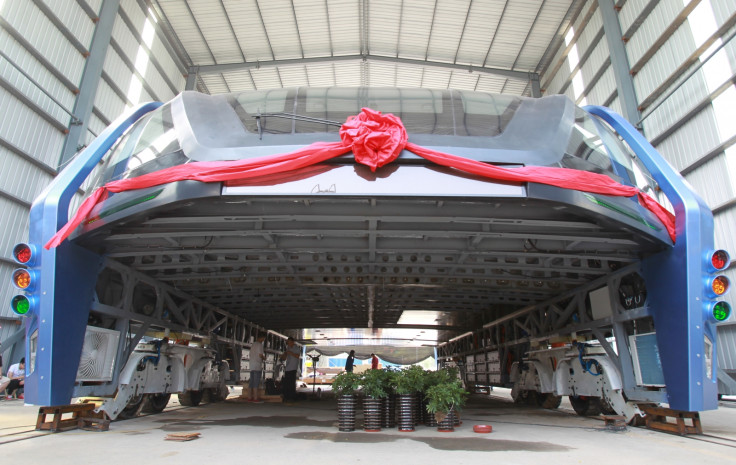China's futuristic elevated road-straddling bus is just an elaborate scam, says state media
New reports claim TEB is a Ponzi scheme run by a 'shady company'.

Chinese state media is reporting that the futuristic road-straddling bus invention that glides 2m above the road so cars can pass beneath it is in fact an elaborate scam aimed at conning investors, and will likely never come to fruition.
The Transit Elevated Bus (TEB) is a solar electric tram-bus hybrid vehicle that can carry up to 1,200 people that runs on rails embedded in roads, similar to a tram. The carriage of the vehicle is elevated above the road in order to ease traffic congestion by effectively separating public transport from private vehicles.
The concept has existed since at least 2010, when Time Magazine called it one of the year's top inventions, but no one was seriously thinking about it as a solution to traffic problems until inventor Song Youzhou showcased a small moving toy model of the TEB at the China Beijing International High-Tech Expo on 22 May.
The huge amount of interest generated prompted TEB Technology Development Company, where Song is the chief engineer, to speed up plans to build an actual working prototype and conduct tests of the vehicle in Qinhuangdao city in Hebei province in northeast China, and on 2 August, the first test drive was announced.
State media reported that a prototype vehicle, TEB-1, with a 7.7m-wide test carriage holding up to 300 passengers was being tested in the Beidaihe District of Qinhuangdao, and TEB held a media event where state and international media such as Reuters were given a guided tour of the whole vehicle.
And despite engineers and tech publications worldwide and in China insisting the TEB is a crazy idea and isn't safe at all, the story and pictures of the straddling bus went viral across social media and multiple major newspapers around the world in early August.
Backlash from Chinese state media
However, many of the same Chinese news publications that had been so complimentary about the TEB-1 are now turning against its creators and making serious allegations about the company.
On 4 August, Global Times posted an article with the urgent headline "Emergency announcement, if you see this news again on another major media site, do not believe it", claiming that Song had only been educated up to primary school level, and that the company funding his invention, Hua Yingkailai, was in fact a peer-to-peer finance company that had been selling fake investment products promising investors huge returns of between 10-13%.
It turns out that Hua Yingkailai is owned by the Huaying Land Group, a property and manufacturing firm, and its chairman is president and CEO of TEB. The newspaper even went as far as comparing Hua Yingkailai to the Ezubao scandal, in which an online lender scammed 900,000 investors out of over 50bn yuan (£5.8bn, $7.5bn), leading to the arrest of 21 people and closure of the online platform in February.
Yesterday (8 August), another state-owned media organisation Xinhua News Agency announced that it had visited TEB's R&D testing facilities in Qinhuangdao and discovered several startling facts. First of all, local government officials claim that they had no prior knowledge of the project and had definitely not signed a strategic agreement allowing the firm to conduct tests along a 120km stretch of land, as claimed by Hua Yingkailai in a press release on 27 April.
There are also allegations that TEB never got off the ground because it had failed to demonstrate the feasibility of the design and misled local government in Beijing and Guangzhou, leading to trials of the technology being cancelled.
Testing facilities quiet, factory not being built
When Xinhua's reporters visited the test site (see Xinhua article linked above for photos), they found electronic signs still read "Beidaihe TEB Global First Test", but that the hybrid vehicle prototype itself was concealed inside a giant steel structure measuring 10m high, 30m long and 9m wide, and ribbons meant to be cut in an official ceremony to open the testing track remained uncut.
The reporters also visited the site where a factory was meant to be built to manufacture TEB vehicles, but, despite the ground-breaking ceremony having long since taken place, they found little more than a large pile of dirt in the middle of a field.
Following allegations in the media that the firm was not licensed to test its technology, Hua Yingkailai said that it was only performing internal tests. Song has rejected the claims of fraud and infeasibility, telling Chinese news site Sixth Tone his critics are "so-called entrepreneurs" and "people who don't recognise true innovation", although he did not address the issues about the testing facilities and factory.
"To be an entrepreneur is to have not only self-belief, but also perseverance," he said, vowing to continue work on the invention.
© Copyright IBTimes 2025. All rights reserved.






















